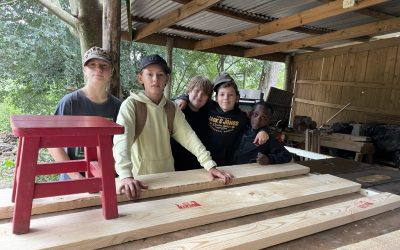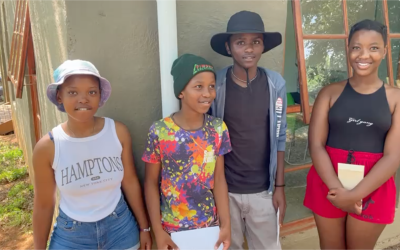Trustee Emily Hogge is spending six months on the ground in South Africa. She is providing monthly despatches exploring the impact our work is having on local communities in KwaZulu Natal and Cape Town. The first report focuses on her initial impressions during the first few weeks of her trip and can be found here http://www.wordpress-455395-2711966.cloudwaysapps.com/life-in-ingwavuma/. This second report looks at the importance of supporting the child beyond the school gate.
During long night fundraising events that I organised and partook in as a student in Bath, UK or late night email correspondences, I have found myself asking “is it really necessary to buy pots and pans? Or do they all really need to go on that school trip, and at times do we need to support them at home as well?” In the last month my questions have been answered with a resounding and long lasting “YES!” I believe supporting the whole child is vitally important in drawing out their academic potential and giving them the opportunity to thrive.
The majority of children I grew up alongside in the UK knew where their home was, sat around the table and ate a hot tasty meal for dinner, felt loved by parents, siblings and friends and generally knew their place in the world. This is sadly not always the case for our children – all of them at some point in their lives, have missed out on one or more of these important principles. Whilst these facets of childhood are missing the children struggle to focus at school, look for attention in negative ways or create havoc as they take out their anger and sadness on those around them. This often leads to an unpredictable and fluctuating journey through school, which takes away the opportunity for the child to reach his or her academic potential.
This has been particularly evident for one of our children over the past month. He is a fourteen year old boy who is studying in Grade Seven at Khethani. He is a kind, polite and hardworking student who loves and respects his family. His mother has a good job but unfortunately it means that for one week out of three she is away from the family home. As a result our child and his brother are left home alone for the week to cook, clean and study on their own. They live a twenty minute drive from the main town centre with no electricity or running water. This creates a tricky dynamic for a child who loves and misses his mum, whose study is restricted by light and who has the added pressure of cooking and cleaning whilst his mother is away. Alongside juggling these practical problems our child struggles emotionally to deal with sleeping alone in a house – something I have yet to do as a twenty four year old. He is a bright student but his grades have not shown this over the past two terms, with dips academically and emotionally when his mother is away. Since my arrival six weeks ago we have brought him a bike, out of the Zoe Trust Enrichment Fund, to make transport to and from school easier, spent hours after school studying with him, negotiated with his mother so that he can spend some days sleeping with her at work, provided him with times to look forward to (like movie watching) and driven him back to his house at night providing him with emotional support and guidance to help him deal with the anxiety and sadness he feels when his mother is away. It has not been an easy journey, but his marks in the final term three exams are considerably higher than pervious exam results and he is growing in confidence. This is an ongoing journey but when I look at him now I see a stronger, happier young man. This would not have been possible if our support stopped at the school gate.
For one of our children who is studying in Grade One at Khethani, the problem is slightly different. He has cerebral palsy, which means he struggles to walk. He has grown tremendously over the past two years at Khethani both in character, confidence and academically. He is a bright young boy whose academic ability should never be a problem. However his inability to walk has the potential to become a limiting factor in the future. Therefore it is vitally important that we provide him and his family with the support, guidance and encouragement needed to help him walk. After six weeks of encouragement and perseverance he is now walking unaided from the car to the classroom and back with his parents watching from a distance – a huge achievement. This ability to move independently around school will give him the freedom to reach his academic potential without his cerebral palsy becoming a limiting factor. Again this would not have been possible if our support stopped at the school gate.
Ekukhayeni orphanage, which the Zoe 
In more subtle ways, providing our children with uniform, stationary, text books and paying for school outings and trips helps them to feel included within the school. Walking around Khethani it is wonderful to see our children totally at ease and integrated into a school which is also home to magistrates’ and doctors’ children. They do not feel different, they feel as loved and special as any other child, which helps to develop happy, content and peaceful students. This is in contrast to six years ago when the trust was in its infancy. I remember feeling like Zoe Trust children at Khethani were a bit different – they seemed sadder and a little shabbier than the rest. This could not be further from the truth today and as a result academically they are doing much better.
So should our support stop at the school gate? No definitely not! But I want to go further; I challenge the Zoe Trust not just to provide financially for our children outside of school, but to strive to also provide emotional support and guidance at every level. I feel this is vital if we are going to support our children to fulfil their potential. So when you have the time I urge you to write to your child, inquire about their studies and provide positive support. It does not have to be a long or colourful letter, a quick email that I can forward on is perfect.
Written by Emily Hogge



